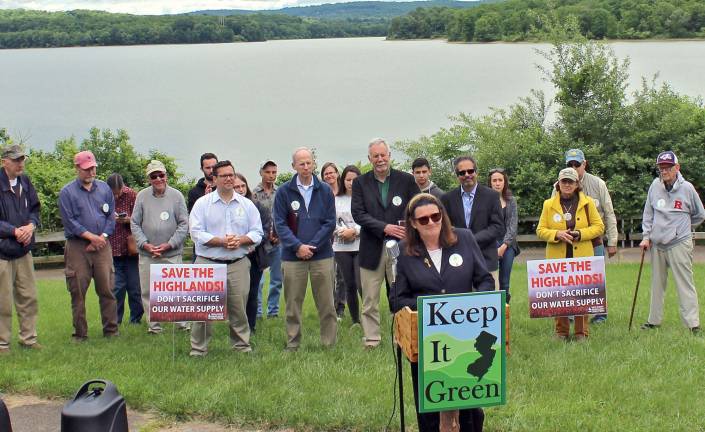Activists rally for NJ water supply

CLINTON — Enviros, elected officials, and academics rallied June 7 on the banks of Spruce Run Reservoir, to raise awareness about the values provided by the Highlands and the importance of preserving lands that protect the Highlands’ water resources. Whether by requiring vegetated buffers around surface waters, or protecting high value forests through regulation or by purchasing land or development rights from willing sellers, the greater the extent that our water resources are buffered from development impacts, the better the quality of water.
“Why does a watershed association care about open space?,” asked Bill Kibler, director of policy for Raritan Headwaters. “The single best indicator of water quality is land use; the more intense the land use, the more water quality is adversely affected. In other words, open space protects clean water.”
“One thing is clear, adequate open space ensures clean drinking water for our children and future generations. It’s vital to New Jersey’s economic vitality that the food & beverage, pharmaceutical and other water intensive industries continue to be supplied with abundant, low-cost, clean drinking water,” said Ed Potosnack, executive director, New Jersey League of Conservation Voters and Chair of the Keep It Green Coalition. Noting that June is Open Space Month, Potosnack said, “It is a fitting time to reflect upon the interrelated values of open space and a clean water supply.”
The New Jersey Department of Environmental Protection recently released for public comment the long overdue draft New Jersey Water Supply Plan, which is supposed to assess the adequacy of the State’s long term water resources and make recommendations for improvements. Many environmentalists have criticized the plan for failing to recommend the necessary actions to correct areas the Plan has identified as in need of improvement, such as withholding new water allocation permits in areas that lack adequate water supplies. This administration has also been criticized for rolling back on protective regulations in its Flood Hazard Area, Water Quality Management Planning, and Highlands regulations.
“Water supplies of the Highlands Region provide critical support to nearly all of northern and central New Jersey, for much of our population and economy and for our rivers and estuaries. Mismanagement of these water resources would harm our state for decades to come,” said Rutgers Dept, of Human Ecology Professor Dr. Dan Van Abs, former director of Policy and Planning at the Highlands Council and former Assistant Administrator at NJDEP, responsible for statewide water resource planning.
Several participants at today’s rally are alarmed by the current Administration’s attempts to weaken implementation of the 2004 Highlands Water Protection and Planning Act, first by stacking the Highlands Council with pro-development, Highlands Act opponents and recently by attempting to weaken the septic density provisions of DEP’s Highlands regulations, which strictly limits development in the forested Highlands Preservation Area.
“As a legislator I understand the essential values provided to all of us in New Jersey by having a plentiful supply of clean drinking water. Threats to our water supply endanger our basic security and undermines our economic well-being—which is why I am working with my colleagues in the State Assembly and in the Senate to invoke a Constitutional provision that empowers the Legislature to invalidate the Department of Environmental Protection’s recently adopted rule that will allow more development in the forests of the Highlands Preservation Area,“ said Assemblyman John F. McKeon (D-Morris), prime sponsor of the Highlands Act and recently the Assembly resolution that will seek to invalidate the DEP rule.
“The Highlands Preservation Area is a 415,000-acre intact forest that provides New Jersey with huge dividends that only increase over time—an abundant clean water supply, a vast diversity of animal and plant species, carbon sequestration, heat absorption, outdoor recreation and tourism dollars. In fact, the US Forest Service found that more people visit the Highlands each year than Yellowstone, Yosemite and the Grand Canyon parks combined,” said Elliott Ruga, policy director, New Jersey Highlands Coalition. “This forest acts as a huge, natural and cost-free water filtration system that is largely the reason New Jersey has the fourth lowest cost of drinking water in the nation. We would be crazy not to do whatever is necessary to protect this resource for generations to come, including purchasing as much land as we can.”